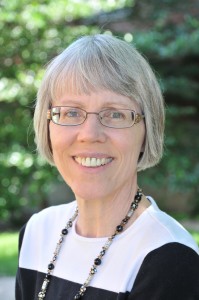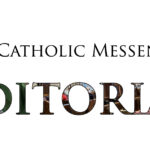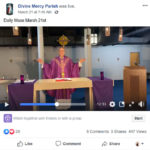By Barb Arland-Fye
Editor
An opportunity to learn about preaching the Old Testament for the coming liturgical season intrigued me, even though I don’t preach. Reflection on Scripture, prayer, current events and personal experiences inspire me in writing this column and editorials for The Catholic Messenger. So when Deacon David Montgomery sent an invitation to deacons, deacon candidates and their spouses about the fall convocation on Preaching the Old Testament in Year C, I asked if I could participate. He responded, “Of course,” and invited me to Mass and dinner with the group.

Some of the deacons and their wives were my classmates for four years in the Master of Pastoral Theology program. The classes I took with Deacon Class VI gave me a deeper appreciation for the ministry of the diaconate and what it means to be servant leaders.
Dr. Matthew Coomber of St. Ambrose University in Davenport, who taught our weekend class Oct. 17-18, infused us with enthusiasm for the subject. Clearly, this assistant professor of Biblical Studies relishes teaching about the Old Testament and learning from his students. He explained what drew him into the Old Testament: the stories. “I started seeing a conversation going on, a conversation between God and humanity — and it’s a rocky one.”
But it’s through these conversations that we discover how God is a God of love, of hope, of faith; God wants us to work with one another, in community, to build our faith. As we reflected on the two stories of Creation in Genesis, where God creates everything in our world and calls it good, I asked about our brokenness as human beings. Coomber responded with an observation: “I can’t imagine the pain God feels seeing people suffer….”
We discussed the breakdown of society and identity in ancient Israel and how the prophets of those times — Isaiah, Micah, Jeremiah and Nehemiah among them — responded. Coomber reminded us that context is incredibly important. The Assyrians didn’t just conquer Israel, but used barbaric methods to intimidate and vanquish the Israelites. Ultimately, the Assyrians bullied themselves into extinction. The Babylonians exiled the Israelites, which resulted in a broken culture and broken relationships. If we know that the ancient Hebrews believed God’s presence was limited to the Ark of the Covenant in the Temple in Jerusalem, then we can appreciate the impact of the destruction of the Temple. The Israelites had to adapt; they had to understand that God was within them, and not limited in time and space.
We explored the meaning of Old Testament Scriptures written at a time of upheaval and despair. Why were the people experiencing these things? Why was society breaking down? What emotions were the authors of these Scriptures and their audiences experiencing? People needed to look beyond themselves, for the sake of the community. We talked about how these Old Testament experiences relate to the world today.
Following our discussions the first day, we attended Mass in the chapel at diocesan headquarters. Bishop Martin Amos preached about the day’s Gospel using the analogy of a pep rally to explore the rivalry between James and John as to who would get special-section seating in the kingdom of God. Jesus’ response speaks to the role of servant leadership.
“Concern for others is a sign of maturing as well as a sign of discipleship,” Bishop Amos observed. “As deacons and deacon candidates, you, above all, are called to be witnesses to accepting Jesus’ invitation to be the servant of all.” The bishop encouraged his listeners to follow Mother Teresa’s advice to do the little things faithfully, such as a smile, a thank you, a hospital or jail visit. He hoped his listeners would be inspired to get excited about the game, to encourage and give support to each other, to feel good, in the best sense of the word, about their ministries.
In the final session, we explored how deacons can preach in a way that invites conversation and draws out meaning for their listeners. I don’t preach, but I gained insight at the convocation for my ministry at The Catholic Messenger.
(Barb Arland-Fye, Editor, can be reached at arland-fye@davenportdiocese.org.)











